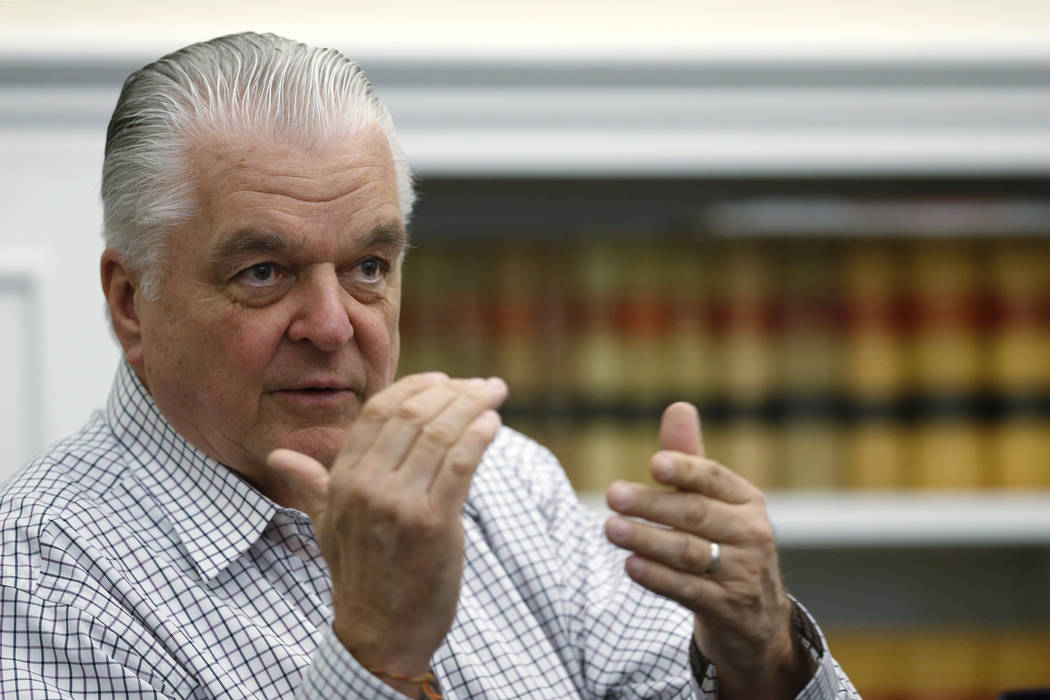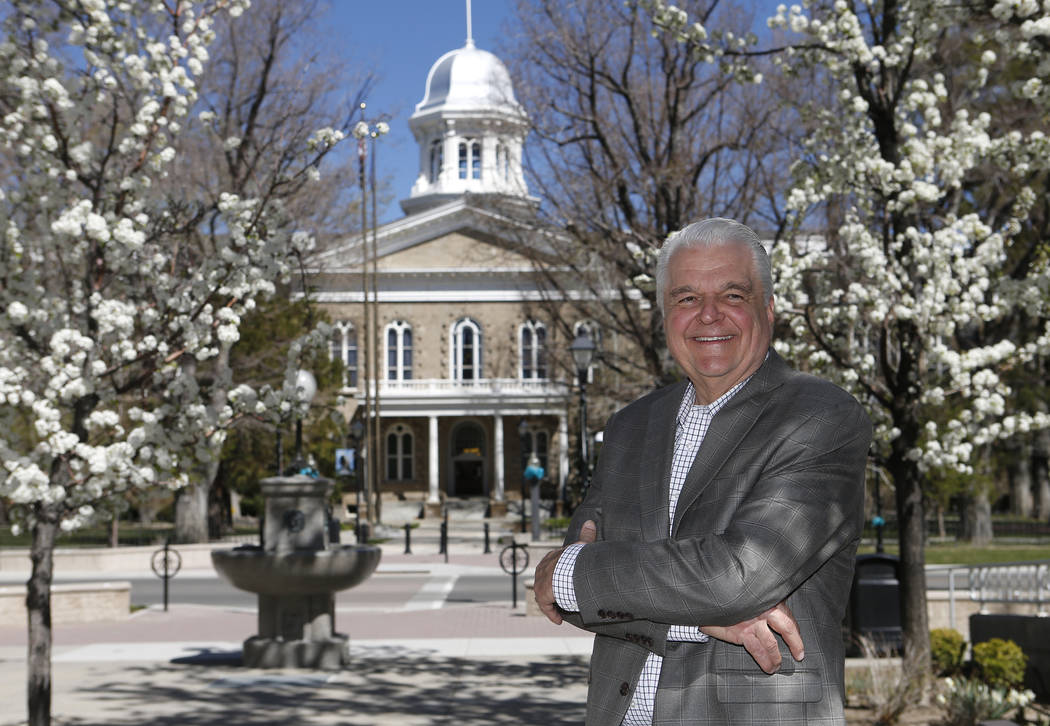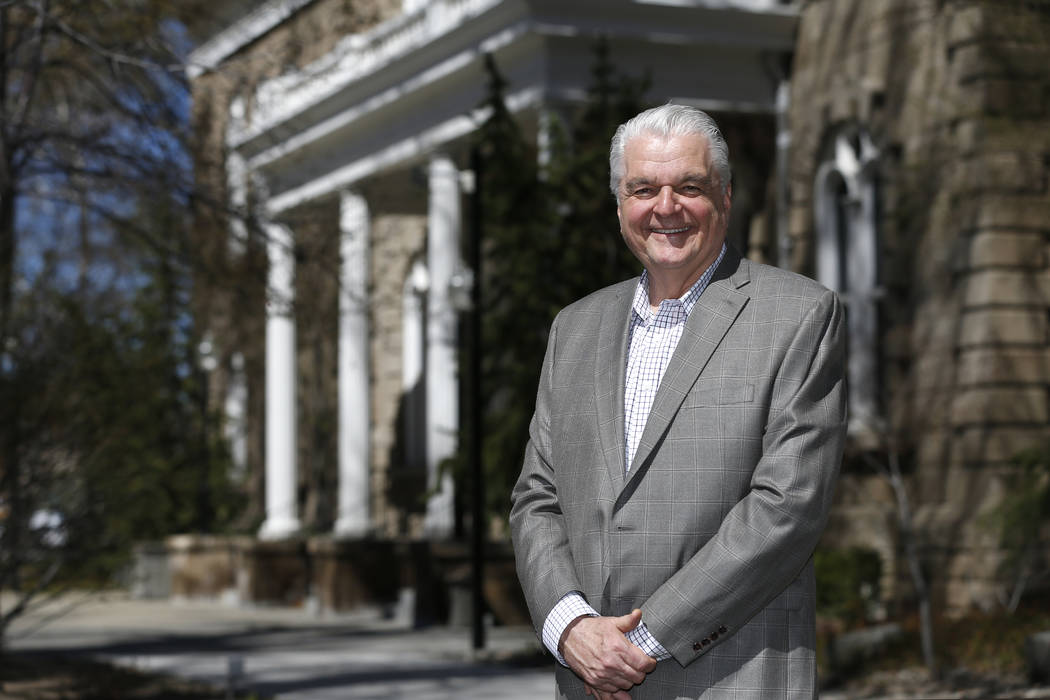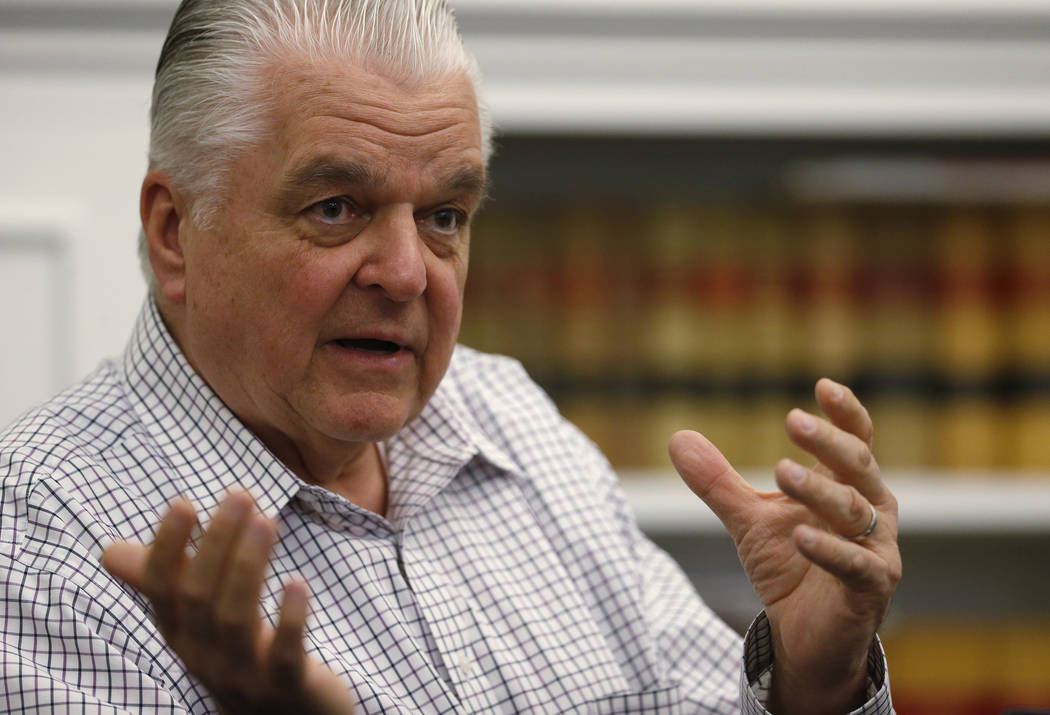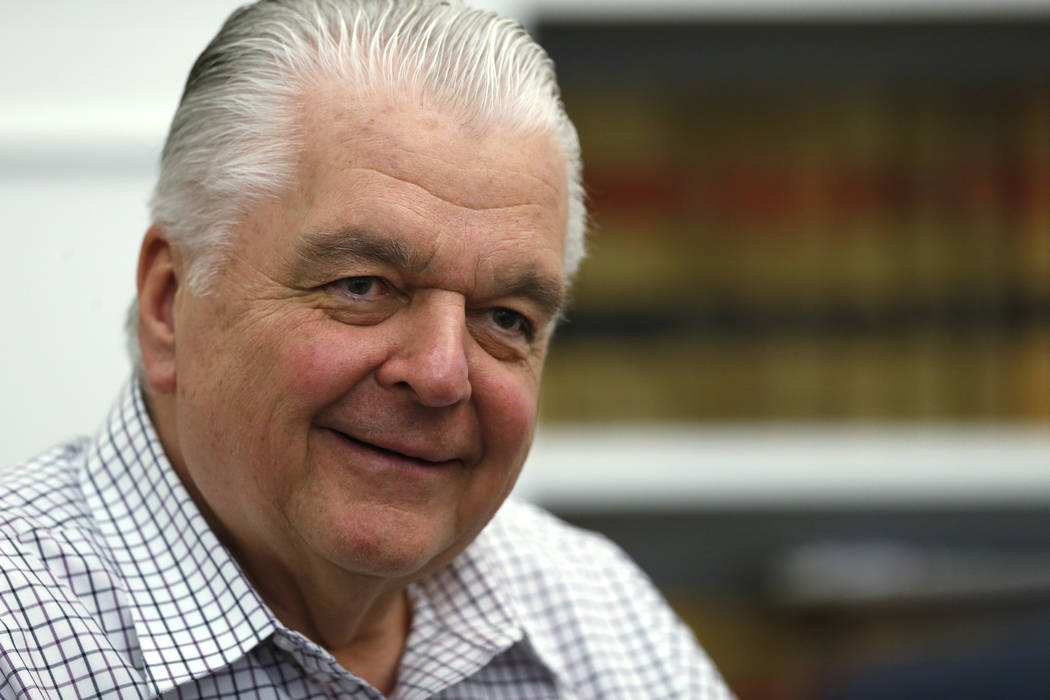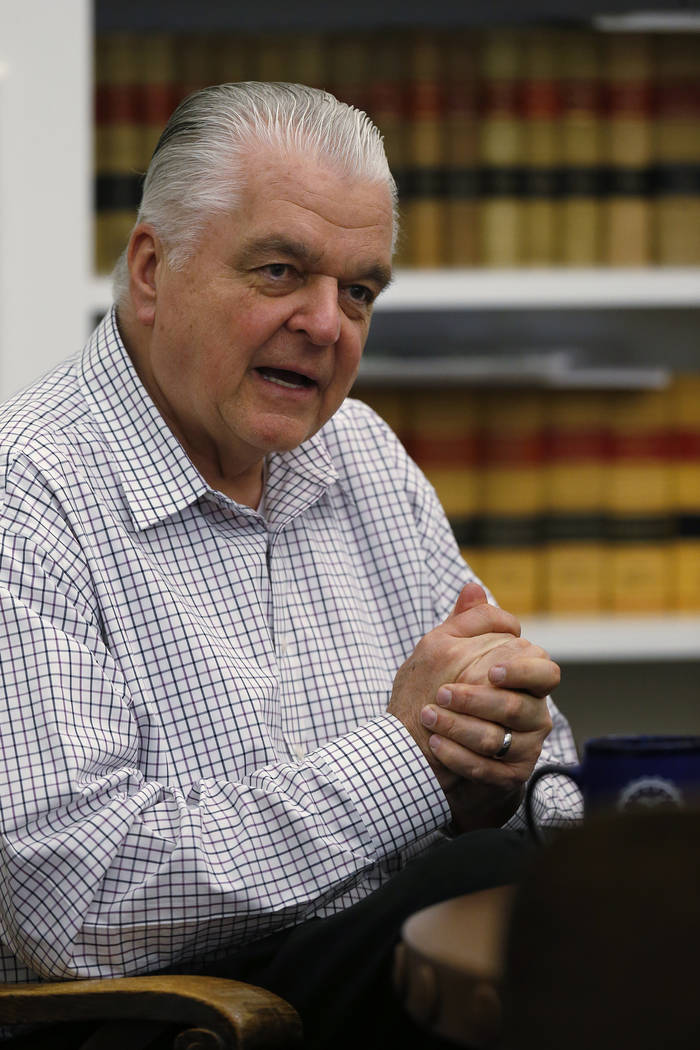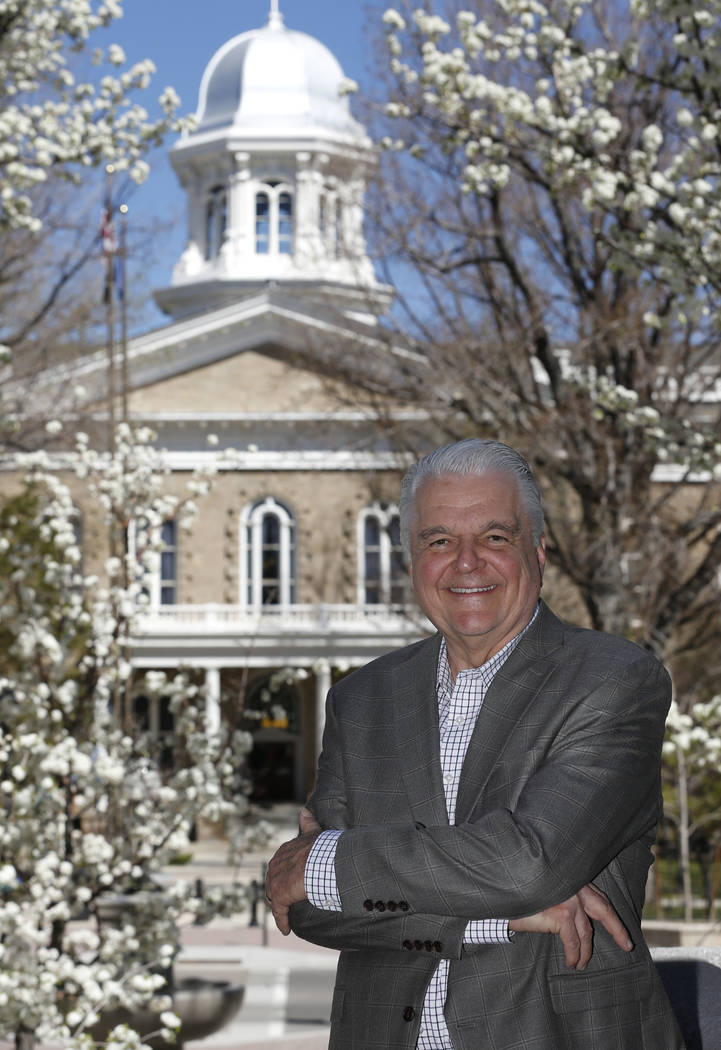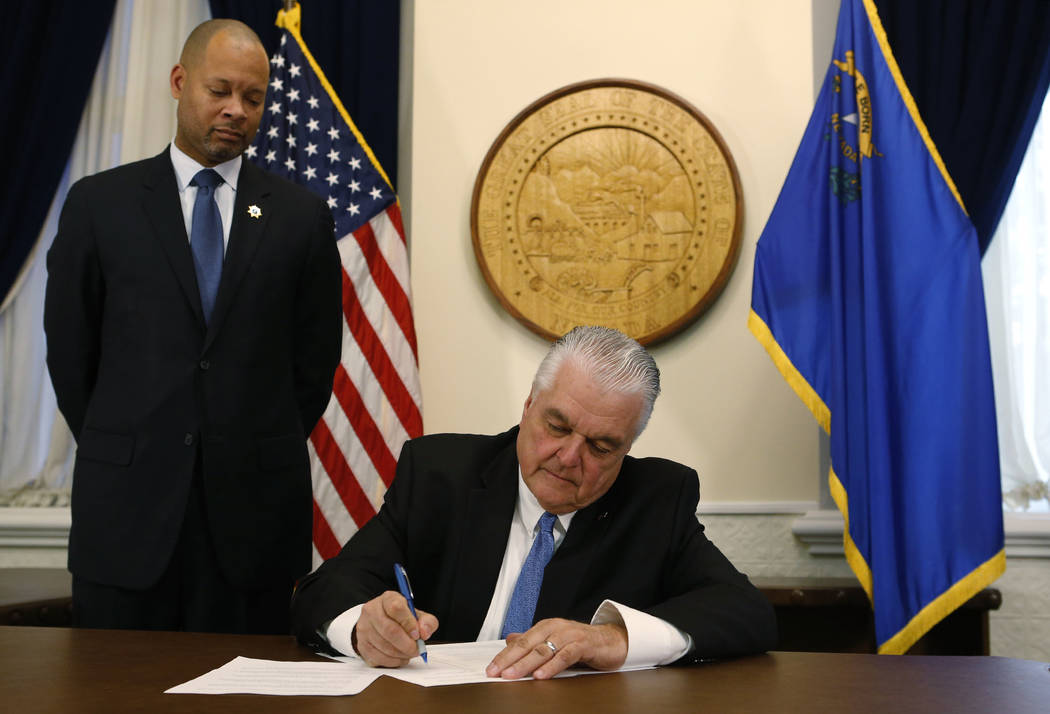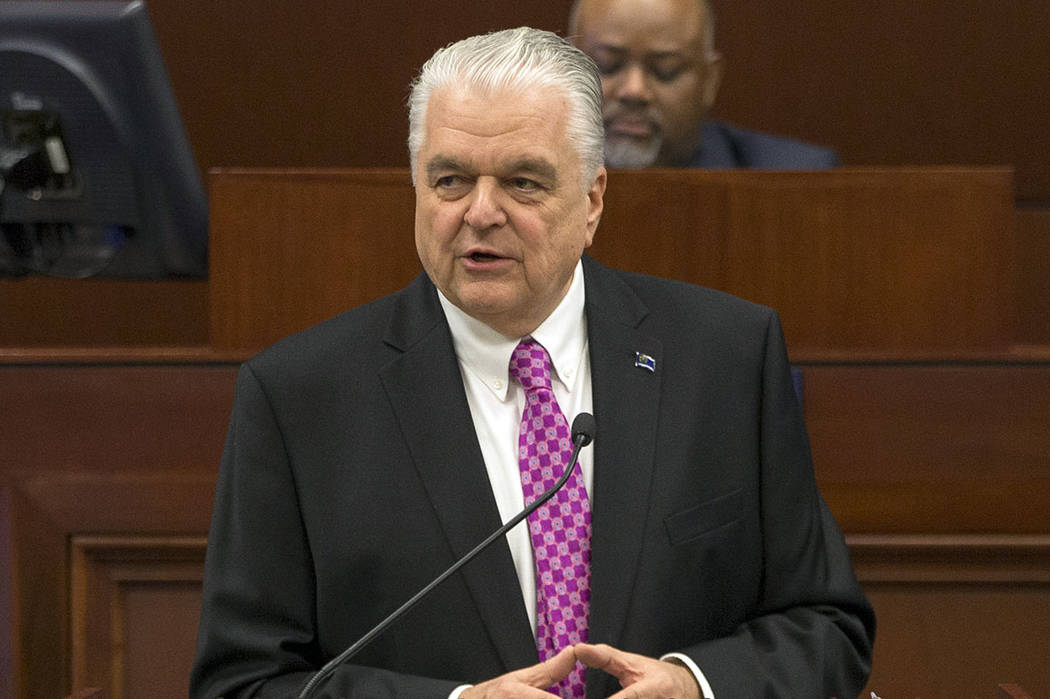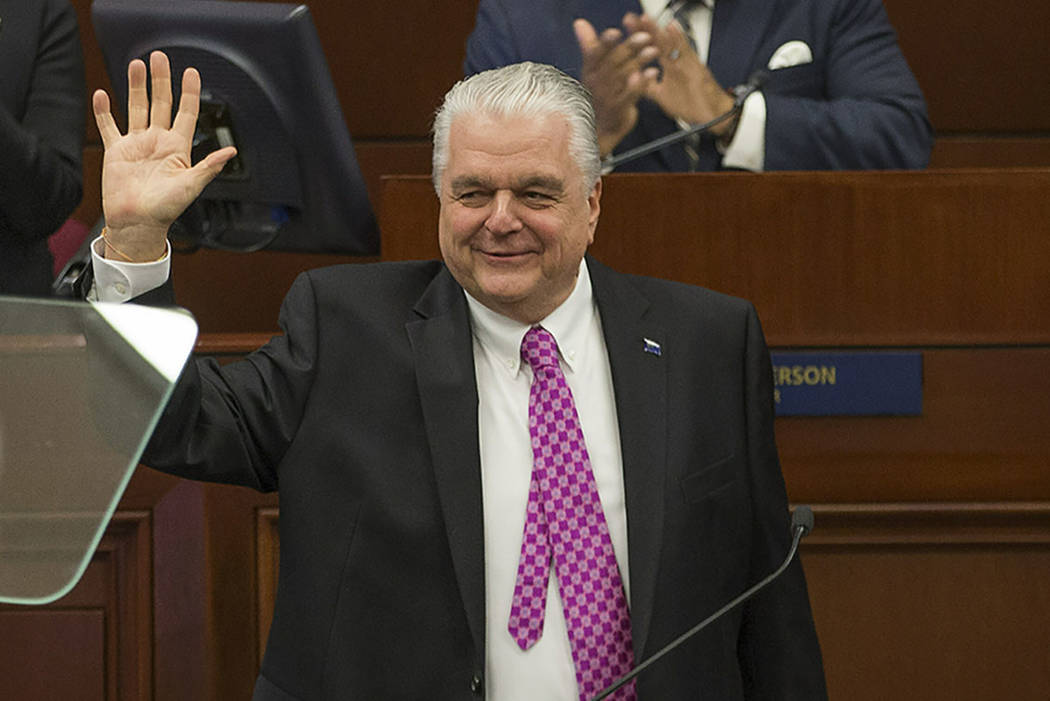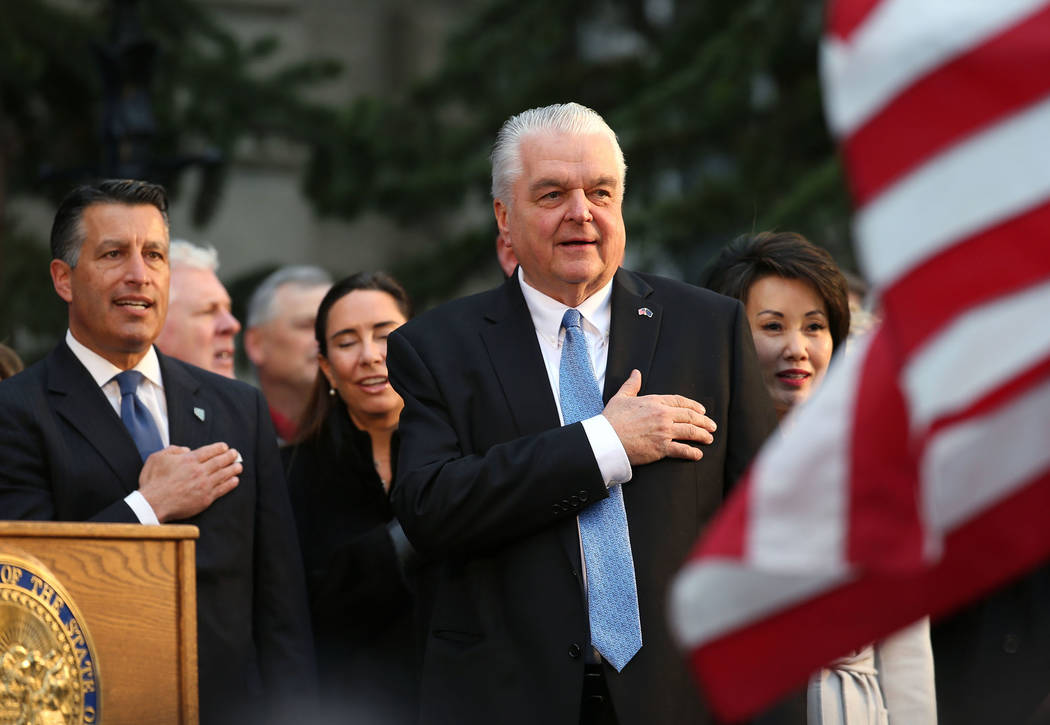Steve Sisolak looks back on first 100 days as Nevada governor
CARSON CITY — On weekdays he’s up at 4 a.m. This particular Thursday, the 102nd day of his first term as Nevada’s first Democratic governor in 20 years, Steve Sisolak started his day with 90 minutes on a treadmill, then coffee and cereal for breakfast. Raisin Bran Crunch. No milk.
“It’s great. It’s crunchy. I like the crunch,” he said. “I’m not a big milk-eater.”
His security detail takes him from the Classical Revival governor’s mansion five minutes from the Capitol to the governor’s office about 7:30 a.m. for a day full of meetings. He’s usually back between 6 and 8 p.m. depending on evening social or constituent events. He brings home reading from work and is often asleep by 8:30.
“Except tonight’s a Knights game, so I’m gonna be up really late. I’m planning on that,” he said, referring to the Las Vegas hockey team which, at the time of the interview, was up 3-1 in a best-of-seven series against the San Jose Sharks. (They lost.) “And then I’m up the next morning, back on the treadmill. And that’s what I do.”
There’s a lot that happens in between morning treadmill and evening wind down, the governor tells two reporters in a 15-minute interview to review his first months in office. Earlier in the week he spelled out his early achievements in a newspaper column and a press release, acceding to the traditional if arbitrary measurement of a new officeholder’s effectiveness right out of the gate.
As is his custom, he sits with neither tie nor jacket, in shirtsleeves. So casual is the conversation at times that only trappings of the office – staff, security, the portraits of former governors on the walls, visitors gathering for his next meeting – give weight to the setting.
‘A lot of bills’
There’s much to talk about when the conversation turns from breakfast to governance.
“The session’s moving quickly,” he says, referring to a Legislature now more than halfway through its 120-day biennial sprint. “There’s a lot of bills, you know? I watch them all day long and I’m on hearings and listening in. And my staff has done an absolutely incredible job briefing me. We’re over on all the things testifying, my cabinet members are, and just keeping up with everything that’s going on. And we’re in constant communication with leadership on bills that are a priority to us and a priority to them, and confident that when we get down to crunch time in another 30 days we’ll be ready.”
As the first Democrat to hold the office since Bob Miller departed in early 1999, his transition saw its share of turnover. He proudly cites his records of hires — more than 70 percent women and minorities.
“They come in and the brief me, and I’m not shy,” he says, telling them:“‘Hey look if I don’t get it, explain it to me another time. I’m not getting this. Explain to me why we need this money or why this law is good.’”
His priorities haven’t changed since taking office, although his handle on how long they take to achieve has. His top concern remains education — the raises he pledged for teachers and other state employees “is huge to me.”
“We allocated 3 percent to those,” he said. “I want to make sure that that gets there, doesn’t get waylaid along the way. There’s a lot of other needs and demands, and when you’re dealing with individual school boards and superintendents it becomes a little bit more complicated.”
Top issue and concern
It’s a topic that’s never far from his mind. To the governor, education is still the biggest issue facing the state.
“It’s long term,” he says. “We didn’t get here in one year, or one session. We’re not going to get out of this mess in one year, one session. But I’ve had a chance to visit a lot of schools and talk to a lot of parents and teachers and students and, and we’ve got to get a better handle on our education system, you know, what options are available to kids.”
Fond of making his point with a story, he recounts meeting a married Reno couple, both teachers, who can’t afford to buy a house on their combined salaries.
“So we need to do something to make sure that we want to recruit and retain the best teachers and we got to compensate them for that and at the same time come up with curriculum that will benefit all the students.”
The governor has come to terms with a halting, often grinding legislative process – with teacher raises, for instance, “I don’t necessarily have as much authority over some of that as I would like” – and is pressing issues including tax credits for affordable housing, and a slew of health care initiatives, all highlights of his first budget and state of the state address. He sees his agenda moving through the Legislature, although time is flying by. To date, lawmakers have sent him only one policy bill that he’s signed into law – a state requirement on background checks for private gun sales, the fulfillment of a key campaign pledge.
“The days sometimes go slow, but the weeks are just flying by,” he says, adding later: “When you start at the beginning you’re, ‘OK four months, that’s a long time.’ It’s not a long time, it’s not a long time at all. Legislators are working hard. … I’ve got the chance to meet all of them, which was really helpful for me, to see what their priorities were so they knew what my priorities were moving forward. And we could have that kind of an understanding how that would work.
“The big surprise is that it’s Thursday this week already. It was just Monday. It seems like yesterday was Monday and then it’s gonna be Easter. I’m going to get them back next Monday again, now the days (left in the session) are going to be in the thirties. You just see the clock ticking away.”
Early skirmishes
With a near-supermajority in the legislature, the governor’s first months have been relatively smooth sailing, at least within the state. The real battles have come with the federal government — over issues involving immigration, health care, the federal government shutdown, and most dramatically, the secret shipment of plutonium into Nevada last fall and potential restart of plans to store nuclear waste at the Yucca Mountain site.
“We went round and round about the plutonium stuff, “ he said. The Department of Energy “is a tough agency to deal with for me. I mean, it’s really, really important. I am very much concerned.”
He said he has spoken with commanders at Fallon Naval Air Station and Nellis Air Force Base about a hypothetical incident where jets would have to be scrambled and in the air in under 10 minutes to intercept a terrorist event at the Yucca site.
“And you say well that’s never going to happen. Nobody thought that they’d fly some planes into the World Trade Center, right?” he said. “There’s a concern that somebody could misuse (Nellis), and having that weaponry stored that close, that nuclear pile is a concern of mine…. I think that the federal government needs to be aware of that, acknowledge it.”
The nightmarish topic sticks out incongruously in a conversation that otherwise weighs more on the everyday concerns of average Nevadans he tries to keep close.
“People think that you’re, you know, in an ivory tower, you’re not available,” he said. “One of the things that I get kind of a kick out of – I know my staff goes a little crazy, the (security) detail does: I can hear the kids come in the front door right over there if they come in. If a school comes in, I’ll just walk into the front lobby and just say hi to the kids and they just are like high-fiving the governor.”
Nevada, he said, “is one of the few places you can still see the governor.”
“I go out, I’m at Smith’s or I’m at a restaurant and walk into people,” he said. “Now, it makes a 30-minute shopping trip into 60 minutes, you know, by stopping and saying hi to people. But we really do have a lot of contact with our constituents. I am proud of that.”
‘I’m in good shape’
Rather than draining him, leading a state of 3 million people seems to have recharged the 65-year-old governor. He took time off in November right after what he acknowledged was a grueling campaign — downtime he used, among other things, to propose to his longtime girlfriend.
“I’m feeling better. I think I’m in good shape. I’m at the treadmill every single day, because, you know, I’ve got to make sure I keep my stress level down.”
He remains in Carson City most of the time but returns to Las Vegas, typically every other weekend. He’ll be there for the Easter weekend to see his mom and children. His wife, Kathy, whom he married shortly before taking office, “comes back and forth, usually on the weekend, she’s here with me. But I’m in the mansion every day. It’s just me and Carson the Tortoise.”
He misses attending Golden Knights hockey games, relegated to watching them on TV and cheering the team on by himself. The pace of the session, as fast as it is, seems to slow to a crawl when it comes to getting things done.
“You can’t do some of these things as quickly as we would have liked it to be done,” he says, adding later: “I got a big supply of pens (to sign bills) and I’m not using them.”
“My advisors tell me this is typical, you know?” he says. “They’ll come in a rush at one time, and we’re following up on them. We’ve got a plan on all of them.”
Contact Bill Dentzer at bdentzer@reviewjournal.com or 775-461-0661. Follow @DentzerNews on Twitter. Contact Colton Lochhead at clochhead@reviewjournal.com or 775-461-3280. Follow @ColtonLochhead on Twitter.
Public Records
As chairman of the Clark County Commission, Gov. Steve Sisolak was a faithful advocate for public access to government records, an issue that the Las Vegas Review-Journal, among other media outlets and access-to-information advocates, have sought to champion. With a number of bills pending on the subject in the Legislature, he told the Review-Journal his support for access has not wavered. His comments:
"I was always a big proponent of public records when I was on the county commission. I frankly never understood why it took so long to produce some of this stuff. It's a shame. It's unfortunate …
"I think that the local jurisdictions need to understand what the rules are. I understand when there's no repercussions for them not following (rules for access), that's where the problem comes in. …When you get into a dispute like the (Clark County) coroner had about, you know, the autopsies from 1 October (shootings). Those are legitimate maybe issues you can talk about. But when you're going in asking for regular records, I never understood on the county commission, I don't understand now, how it takes so long. And I think something has to be done to simplify that. I mean, we're doing the people's business. That information has to be made available."
The governor also said some governments and other public agencies set too-high costs for providing public records.
"To get a police report shouldn't cost you $20, $30, $50, you know?" he said. "When you say public records, people need to remember they're public. That means the public has a right to see them. It shouldn't be a game of, you know, hide and seek in terms of how to find (them)."



